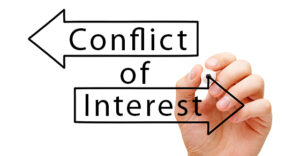
Identifying potential conflicts of interest with auditors is important. If one exists, it could impair objectivity and even compromise your company’s financial statements.
Conflict of interest defined
The American Institute of Certified Public Accountants (AICPA) determines conflict of interest to exist if “a member performs a professional service for a client and the member or his or her firm has a relationship with another person, entity, product or service that could, in the member’s professional judgment, be viewed by the client or other appropriate parties as impairing the member’s objectivity.”
It is important to check for conflict of interest when
- Hiring an auditor,
- Upgrading the level of assurance from a compilation or review to an audit, and
- Using an auditor for other purposes like investment advisory and human resource consulting.
While some conflicts may be obvious, others require closer examination and analysis of the facts to uncover.
One example of conflict of interest is if an auditor recommends a service to a client on whom they are performing an audit and then receives a kickback from that service provider. Even if the provider meets the company’s needs, the payment suggests the potential for an alternate motivation to exist. For this reason, the AICPA prohibits auditors from accepting any third party payments involving companies whom they are auditing.
Another issue could arise if an auditor attempts to serve two different companies who are engaged in a legal dispute with each other. Because the auditor possesses inside knowledge of both firms, they are experiencing a conflict of interest. The AICPA’s professional standards prohibit the auditor from serving both firms.
Avoiding conflict of interest for auditors
Auditors must be careful to avoid conflict of interest. Should a conflict arise, auditors may
- Seek guidance from legal counsel or a professional body,
- Disclose the conflict and secure consent from all parties to proceed,
- Avoid the conflict by segregating responsibilities within the firm, and/or
- Decline or withdraw from the engagement.
Companies should consult auditors about how their firms avoid conflicts of interest before and during an engagement. At some firms, partners and staff are required to complete annual compliance-related questionnaires and participate in programs on avoiding conflict of interest. Firms should also monitor audits on an ongoing basis, because circumstances may change over time.
How we can help
Conflicts of interest are an issue our firm takes seriously. If you suspect that a conflict exists, contact us for help. We’ll assist you in determining whether conflict exists and finding an appropriate way to handle it.
